If you are worried about the environment and looking to reduce your carbon footprint a great place to start is with your washing machine. Here we take a look at the best eco friendly washing machines brands. Our hope is that this will help you chose one of the best eco friendly washing machines that is still capable of delivering to your everyday needs.
10 Best Eco Friendly Washing Machines
| Brand | Key Features |
|---|---|
| LG |
|
| Samsung |
|
| Bosch |
|
| Beko |
|
| Miele |
|
| Fisher & Paykel |
|
| Haier |
|
| Hoover |
|
| Electrolux |
|
1. LG Washing Machines
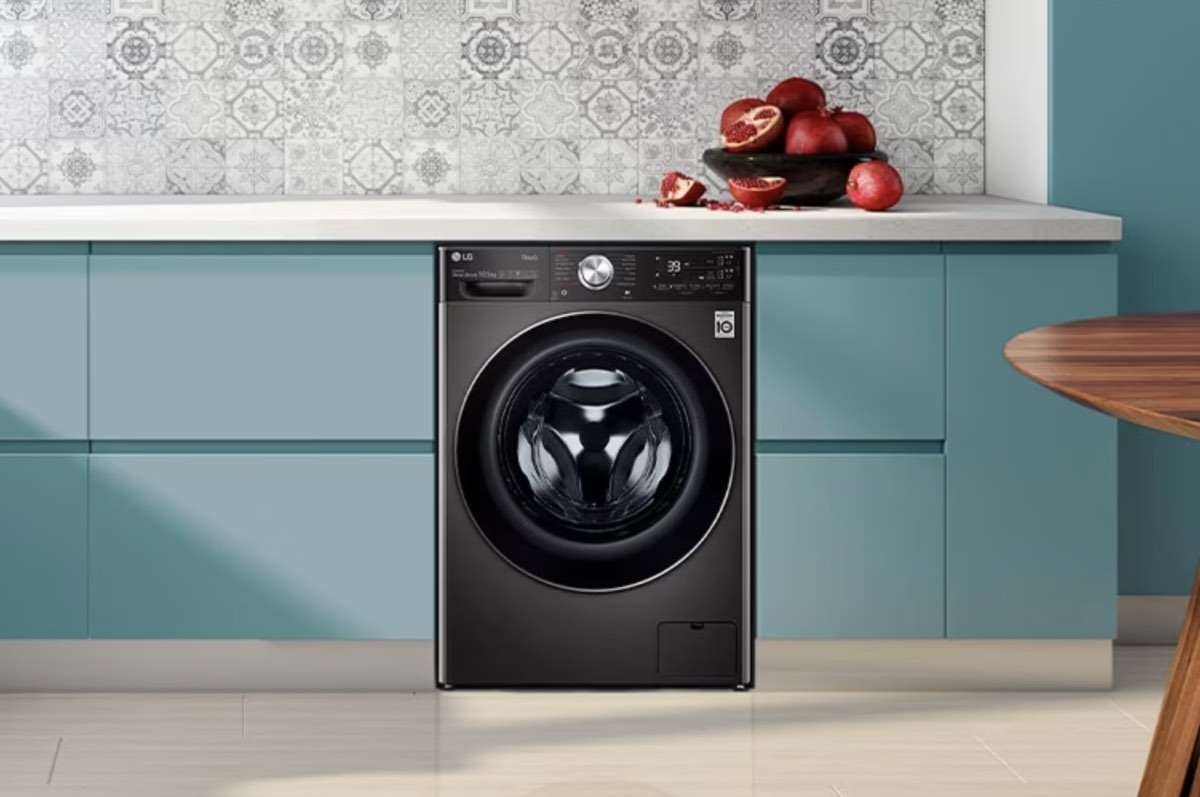
LG stands out as one of the best eco friendly washing machines, constantly pushing boundaries with innovative technology that reduces environmental impact without sacrificing performance. Here’s what makes LG a champion for sustainable laundry care:
-
AI Direct Drive Technology (AI DD™): This innovative feature uses artificial intelligence to recognize the fabric type and weight of your laundry. AI DD™ then customizes the wash cycle to optimize water usage, energy consumption, and wash time for each load. This intelligent approach minimizes resource waste.
-
TurboWash™ Technology: LG’s TurboWash™ technology focuses on reducing washing time while maintaining cleaning effectiveness. Several variants of TurboWash™ exist, like TurboWash 360° which utilizes multi-directional water jets for a faster and more efficient clean. Shorter wash cycles translate to lower energy consumption.
-
Energy Star Certified: Many LG washing machines earn Energy Star certification. This certification guarantees they meet strict energy efficiency standards, meaning they use significantly less energy than conventional models.
-
Steam Technology: Several LG washers incorporate TrueSteam™ technology. This technology utilizes steam to sanitize clothes and reduce wrinkles, potentially eliminating the need for separate sanitizing cycles or heavy ironing, which can consume additional energy.
-
Commitment to Sustainability: LG prioritizes environmental responsibility throughout their operations. They continuously improve their manufacturing processes to reduce waste and incorporate recycled materials where possible. Additionally, LG invests in renewable energy sources to power their facilities.
LG washing machines combine cutting-edge technology like AI DD™ and TurboWash™ with a commitment to energy efficiency and sustainable practices. This combination makes them a top choice for eco-conscious consumers seeking exceptional cleaning with a reduced environmental impact.
Check out the LG washing machine range by clicking here.
2. Samsung Washing Machines
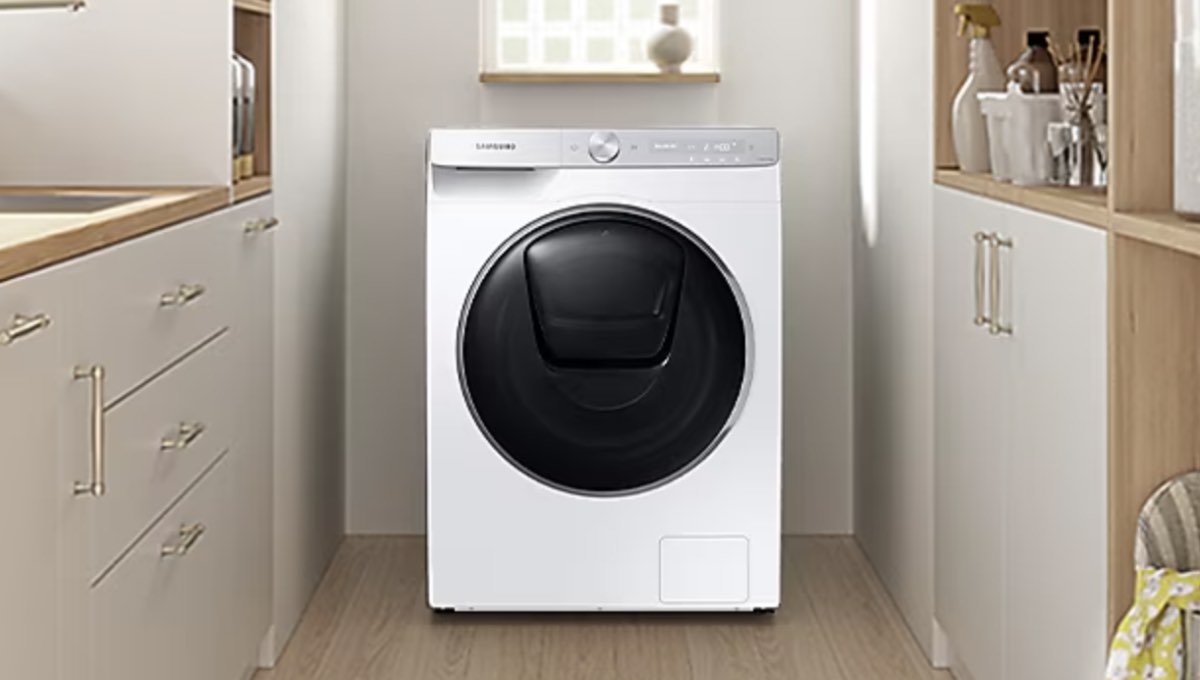
Samsung isn’t just a household name in electronics, they’re also a major player in eco friendly washing machines market. Samsung washers integrate innovative technologies with resource conservation in mind, offering powerful cleaning without compromising on environmental responsibility. Here’s what makes them a contender for your eco-conscious laundry room:
-
EcoBubble™ Technology: This innovative feature pre-mixes air, water, and detergent to create a dense bubble cushion. These bubbles clean clothes more effectively at lower temperatures, resulting in significant energy savings.
-
Digital Inverter Technology: Samsung’s Digital Inverter motors operate efficiently and quietly. These durable motors use up to 50% less energy compared to traditional washing machine motors, contributing to lower energy consumption over the lifespan of the appliance.
-
Automatic Optimal Wash: Many Samsung washers boast automatic load detection and wash cycle optimization. The washer weighs the laundry load and adjusts water levels, wash time, and even detergent dosage to ensure optimal cleaning with minimal resource waste.
-
Steam Cleaning Options: Similar to LG, some Samsung washers feature steam technology. Samsung’s Steam Sanitize cycle utilizes steam to sanitize clothes and eliminate bacteria, potentially reducing the need for harsh chemicals or hot water washes that consume more energy.
-
Durability and Reliability: Samsung washing machines are known for their durability. A long-lasting washer reduces waste compared to frequently replacing less reliable models. This indirectly contributes to a smaller environmental footprint.
Samsung washing machines balance cutting-edge technologies like EcoBubble™ and Digital Inverter motors with a focus on water and energy efficiency. Their durable construction adds to their eco-friendly appeal. If you’re looking for a powerful and resource-conscious washing machine from a trusted brand, Samsung is a strong contender.
Check out the Samsung Washing Machine range by clicking here.
3. Bosch Washing Machines
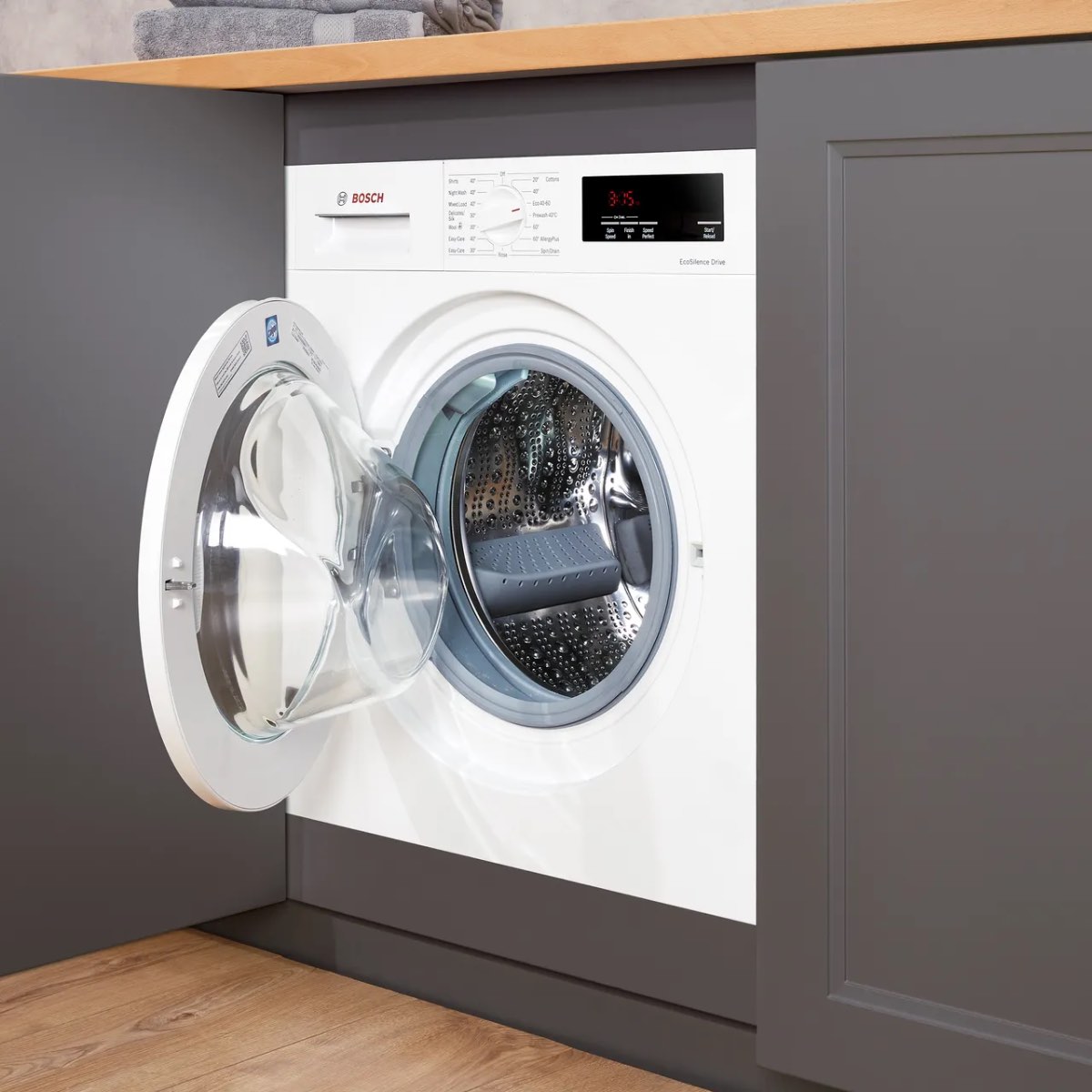
Bosch has emerged as a leader in eco-friendly washing machines, consistently prioritizing resource conservation and energy efficiency in their appliances. Here’s what sets them apart:
-
Water Efficiency: Bosch washing machines are known for their advanced water management systems. Technologies like AquaMix and ActiveWater™ precisely adjust water levels based on the load size, preventing wasteful water usage. Some models can even clean a full load with as little as 12 gallons of water.
-
Energy Efficiency: Bosch washers are equipped with energy-saving technologies like EcoSilence Drive™ motors. These brushless motors operate quietly while consuming less energy than traditional motors. Many Bosch washers achieve Energy Star certification, meaning they meet strict energy efficiency standards.
-
Automatic Load Detection: Many Bosch models boast automatic load detection features. The washer weighs the laundry load and adjusts the water level, wash time, and energy consumption accordingly. This eliminates over-washing and unnecessary energy use.
-
Durable Construction: Bosch washing machines are built to last. A high-quality, durable washer reduces waste compared to frequently replacing less reliable models. This indirectly contributes to a smaller environmental footprint.
-
Sustainable Practices: Bosch is committed to environmental responsibility throughout their operations. They utilize recycled materials in their manufacturing processes and strive to reduce their carbon footprint throughout their supply chain.
Check out the Bosch washing machine range by clicking here.
4. Beko Washing Machines
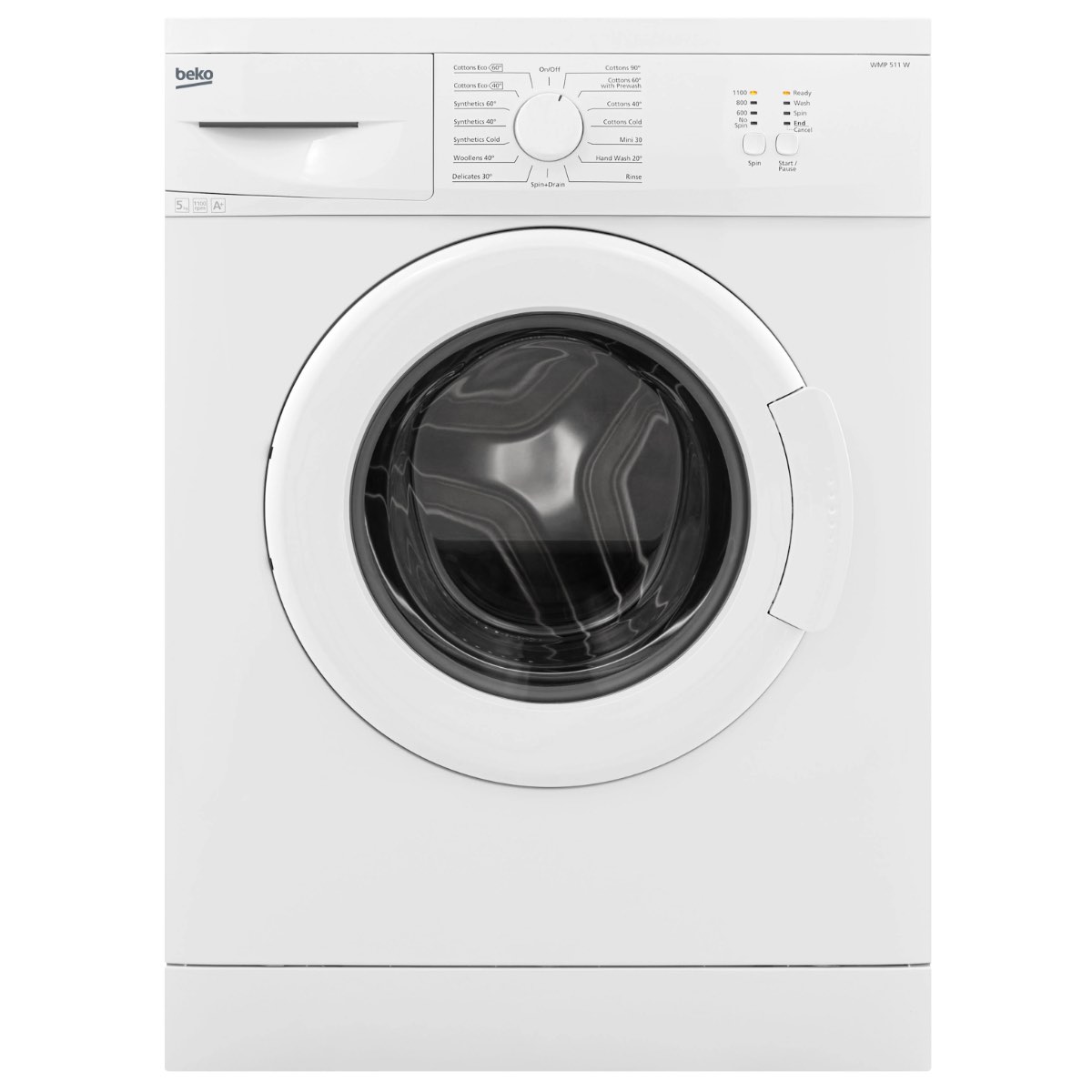
Beko washing machines are well know for having a unique blend of eco-friendly features and sustainable practices. Here’s why Beko deserves a spot on your list of eco-conscious washing machine contenders:
-
RecycledTub™ Technology: Beko takes a groundbreaking approach by incorporating recycled plastic bottles into their washing machine tubs. This innovative technology reduces reliance on virgin plastic and contributes to waste reduction. Up to 10% of each tub may be comprised of recycled materials.
-
Water Efficiency: Beko washers boast advanced water management systems. Features like AquaTech™ optimize water usage by adjusting water levels based on load size. This minimizes water waste and ensures effective cleaning without excess water consumption.
-
Energy-Saving Programs: Many Beko washing machines offer eco-friendly wash cycles designed to reduce energy consumption. These cycles may utilize lower wash temperatures or shorter wash times, all while delivering satisfactory cleaning results.
-
Commitment to Sustainability: Beko prioritizes environmental responsibility throughout their operations. They strive to reduce their carbon footprint and utilize recycled materials where possible in their manufacturing processes.
Beyond Eco-Features:
- Durability: Beko washing machines are known for their reliability. A long-lasting washer reduces waste compared to frequently replacing less durable models. This indirectly contributes to a smaller environmental footprint.
Considerations:
- Limited Availability: Beko might not be as widely available as some other brands depending on your location. Research availability in your area before setting your sights on a specific Beko model.:
Beko washing machines stand out for their innovative use of recycled materials in the RecycledTub™ technology. Combined with water-saving features, energy-efficient programs, and a commitment to sustainability, Beko offers a compelling choice for eco-conscious consumers seeking resource-conscious washing machines with a unique eco-friendly approach.
Check out the Beko washing machine range by clicking here.
5. Miele Washing Machines
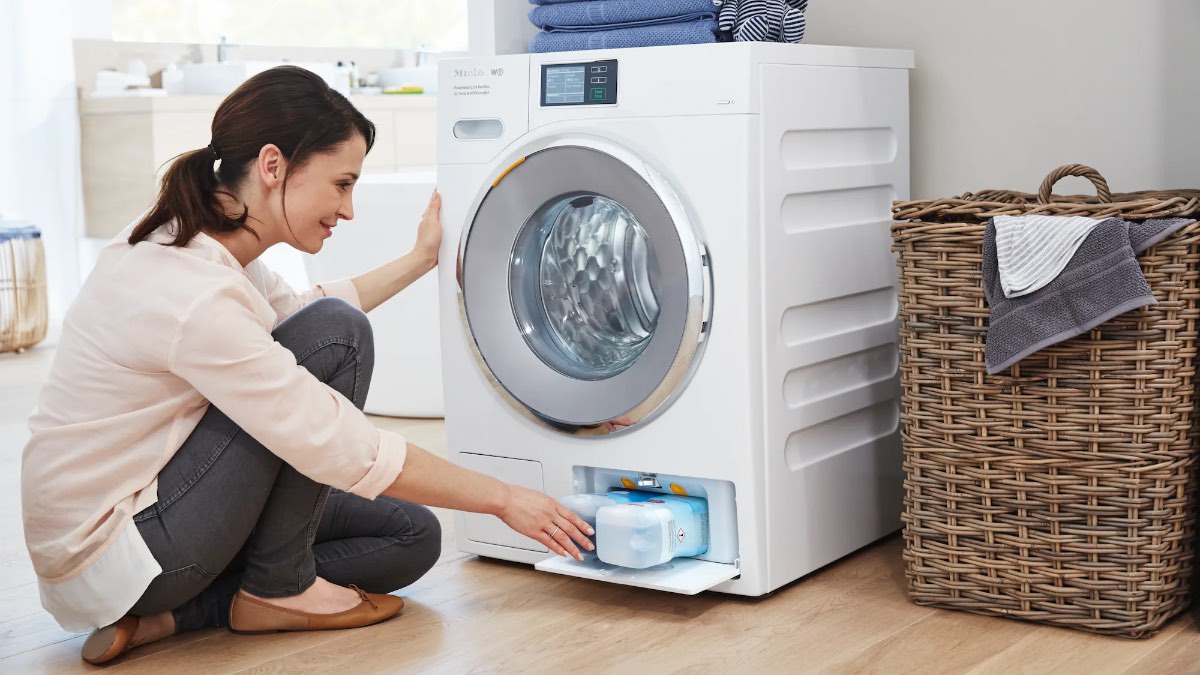
Miele has a reputation for exceptional quality and longevity in all their appliances, and their washing machines are no exception. While sheer energy efficiency might not be their sole focus, Miele takes a multi-pronged approach to environmental responsibility that makes them a compelling choice for the eco-conscious consumer. Here’s why Miele stands out:
-
Unmatched Durability: Miele washing machines are renowned for their durability. They’re rigorously tested to last for the equivalent of 20 years of use. This significantly reduces waste compared to frequently replacing less durable washers.
-
Precise Water Management: Miele washers boast advanced water management systems that precisely adjust water levels based on the load size. This technology prevents water waste and ensures optimal cleaning without excessive water usage.
-
Energy Efficiency: While not always the most energy-star focused brand, Miele washers do incorporate energy-saving technologies like efficient motors and heat exchangers. Combined with their precise water management, they strive for overall resource efficiency.
-
Sensor Technology: Many Miele washers utilize advanced sensors to optimize wash cycles. These sensors monitor factors like water temperature and soiling level to adjust washing time and energy consumption as needed. This eliminates over-washing and unnecessary energy use.
-
Sustainable Practices: Miele prioritizes environmental responsibility throughout their operations. They utilize recycled materials in their manufacturing processes and continuously seek ways to reduce their carbon footprint. Additionally, they offer spare parts for up to 15 years after purchase, extending the lifespan of their appliances.
Miele washing machines might not always be the absolute leaders in raw energy efficiency. However, their unmatched durability, precise water management, sensor technology, and commitment to sustainable practices make them a top choice for eco-conscious consumers who value longevity and resource conservation over the entire lifecycle of the appliance.
Check out the Miele washing machine range by clicking here.
6. Kenmore Washing Machines
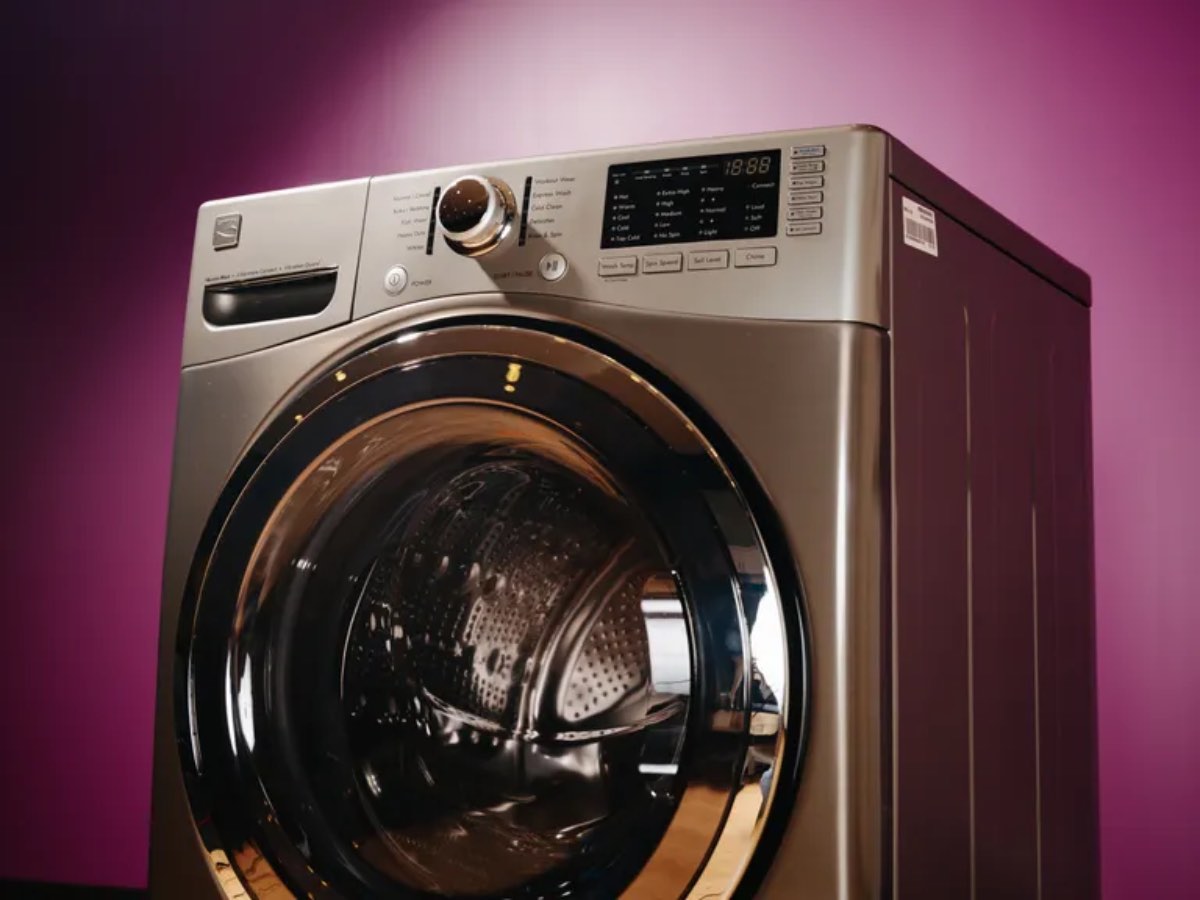
Kenmore washing machines offer a mixed bag when it comes to eco-friendliness. While some models excel in specific areas, transparency regarding overall environmental impact can be limited. Here’s a breakdown of what Kenmore offers and considerations to keep in mind:
Potential Eco-Friendly Aspects:
-
Energy Star Certified Models: Kenmore offers a selection of washing machines that have earned Energy Star certification. This guarantees they meet strict energy efficiency standards, meaning they use significantly less energy than conventional models.
-
Water Level Selection: Many Kenmore washers allow users to choose water level settings based on load size. This flexibility helps prevent water waste by adjusting water usage according to laundry needs.
-
Durable Construction: Kenmore appliances are known for their durability. A long-lasting washer reduces waste compared to frequently replacing less reliable models. This indirectly contributes to a smaller environmental footprint.
Considerations to Keep in Mind:
-
Limited Eco-Friendly Information: Finding specific details about recycled materials or the carbon footprint of Kenmore washers can be challenging. Transparency on these aspects would strengthen their eco-credentials.
-
Varying Efficiency Levels: Not all Kenmore washers are created equal in terms of energy and water efficiency. Carefully research specific model information to make an informed choice based on your priorities.
-
Focus on Features Over Eco-Innovation: Some Kenmore models prioritize convenience features like smart connectivity over cutting-edge eco-technologies found in other brands. Consider whether these features align with your eco-conscious goals.
Kenmore washers can be a viable option for eco-conscious consumers, particularly if you find a model with Energy Star certification and water level selection. However, the lack of clear information about recycled materials and carbon footprint is a drawback. For those seeking the most eco-friendly washing machines with a strong focus on sustainable innovation, other brands might be a better fit.
Check out the Kenmore washing machine range by clicking here.
7. Fisher & Paykel Washing Machines
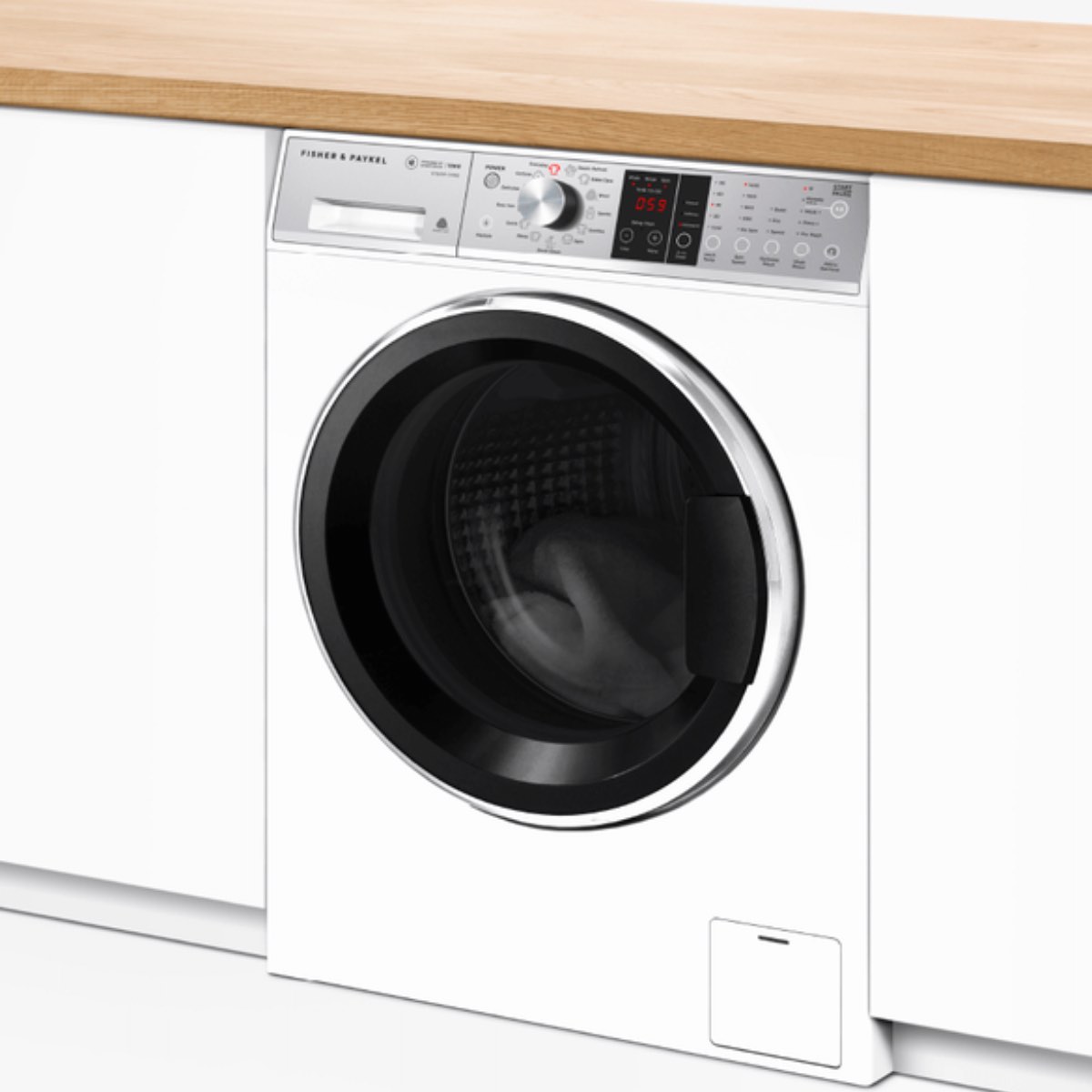
Fisher & Paykel washing machines blend eco-conscious features with sleek design aesthetics. Here’s why they might be a good fit for your eco-friendly laundry room:
-
Sensor Technology: Many Fisher & Paykel washers utilize intelligent sensors. These sensors detect load size and soil level, automatically adjusting water levels, wash times, and detergent needs for optimal cleaning with minimal resource waste. This prevents over-washing and unnecessary energy and water consumption.
-
Eco Wash Option: Several Fisher & Paykel models offer a dedicated Eco Wash cycle. This cycle prioritizes water and energy efficiency by utilizing lower wash temperatures and potentially shorter wash times while still delivering effective cleaning results.
-
Water Efficiency: Fisher & Paykel washers incorporate water management systems that adjust water levels based on load size. This technology helps prevent water waste and ensures efficient cleaning without excess water usage. Some models achieve high water efficiency ratings.
-
Durable Construction: Fisher & Paykel appliances are known for their quality and durability. A long-lasting washer reduces waste compared to frequently replacing less reliable models. This indirectly contributes to a smaller environmental footprint.
While Fisher & Paykel prioritizes eco-friendly features, there are a few considerations:
-
Limited Transparency on Sustainability: Specific details about recycled materials or the carbon footprint of their washers might not be readily available. More transparency would strengthen their eco-credentials.
-
Focus on Design: Some Fisher & Paykel models prioritize aesthetic appeal alongside eco-friendly features. Consider whether cutting-edge eco-technologies or sleek design are more important to you.:
Fisher & Paykel washing machines offer a blend of eco-friendly features like sensor technology and Eco Wash cycles with a focus on quality and design. If you value both resource efficiency and aesthetic appeal, Fisher & Paykel could be a strong contender for your eco-conscious laundry needs.
Check out the Fisher & Paykel washing machine range by clicking here.
8. Haier Washing Machines
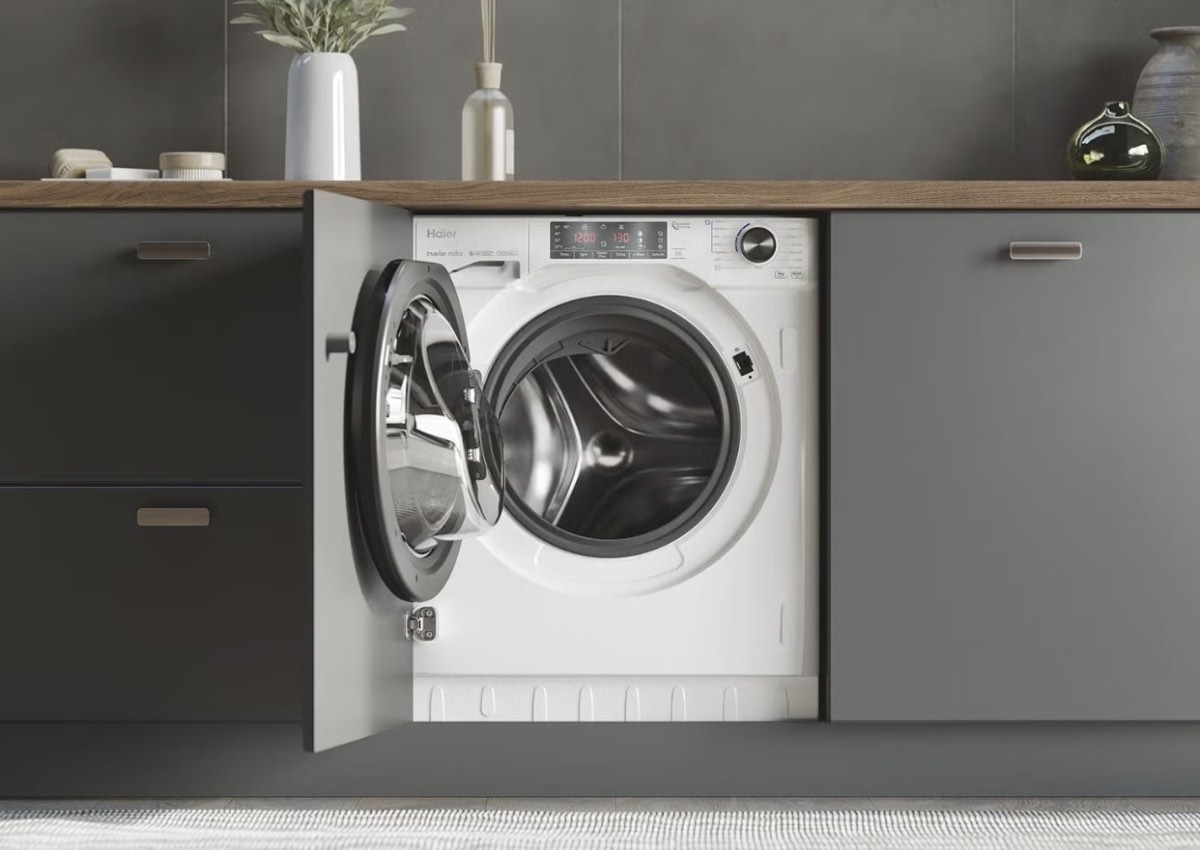
Haier washing machines may not be the absolute frontrunners in eco-friendliness, but they offer a well-rounded package for environmentally conscious consumers who prioritize efficiency and clean design. Here’s why Haier deserves a spot on your eco-washing machine shortlist:
-
Resource-Efficient Washing: Haier washers boast technologies like fuzzy logic and sensor washing. These features adjust water levels, wash times, and detergent needs based on load size and soil level. This minimizes resource waste and ensures efficient cleaning without excessive water or energy consumption.
-
Direct Drive Motors: Many Haier washers utilize energy-efficient Direct Drive motors. These motors operate quietly and efficiently, potentially contributing to lower energy use over the lifespan of the appliance.
-
Steam Cleaning Options: Select Haier models include steam cleaning functions. Steam can sanitize clothes and reduce wrinkles, potentially eliminating the need for harsh chemicals or heavy ironing which can consume additional energy.
A Focus on User-Centric Design:
While not the most prominent aspect of their eco-friendliness, Haier’s focus on user-centric design indirectly contributes to environmental benefits. Their intuitive controls and clear wash cycle options can help users avoid inadvertently selecting cycles that use excessive water or energy.
Considerations to Keep in Mind:
-
Limited Eco-Transparency: Specific details about recycled materials or the carbon footprint of Haier washers might not be widely available. More transparency on these aspects would strengthen their eco-credentials.
-
Focus on Features Over Cutting-Edge Eco-Innovation: Some Haier models prioritize convenience features like smart connectivity over the absolute most cutting-edge eco-technologies found in other brands. Consider whether these features align with your eco-conscious goals.
Haier washing machines offer a balance of resource-efficient technologies like sensor washing and Direct Drive motors with a user-friendly approach to laundry care. If you value efficiency, clean design, and intuitive controls that can help avoid unnecessary resource use, Haier could be a good fit for your eco-conscious laundry room.
Check out the Haier washing machine range by clicking here.
9. Hoover Washing Machines
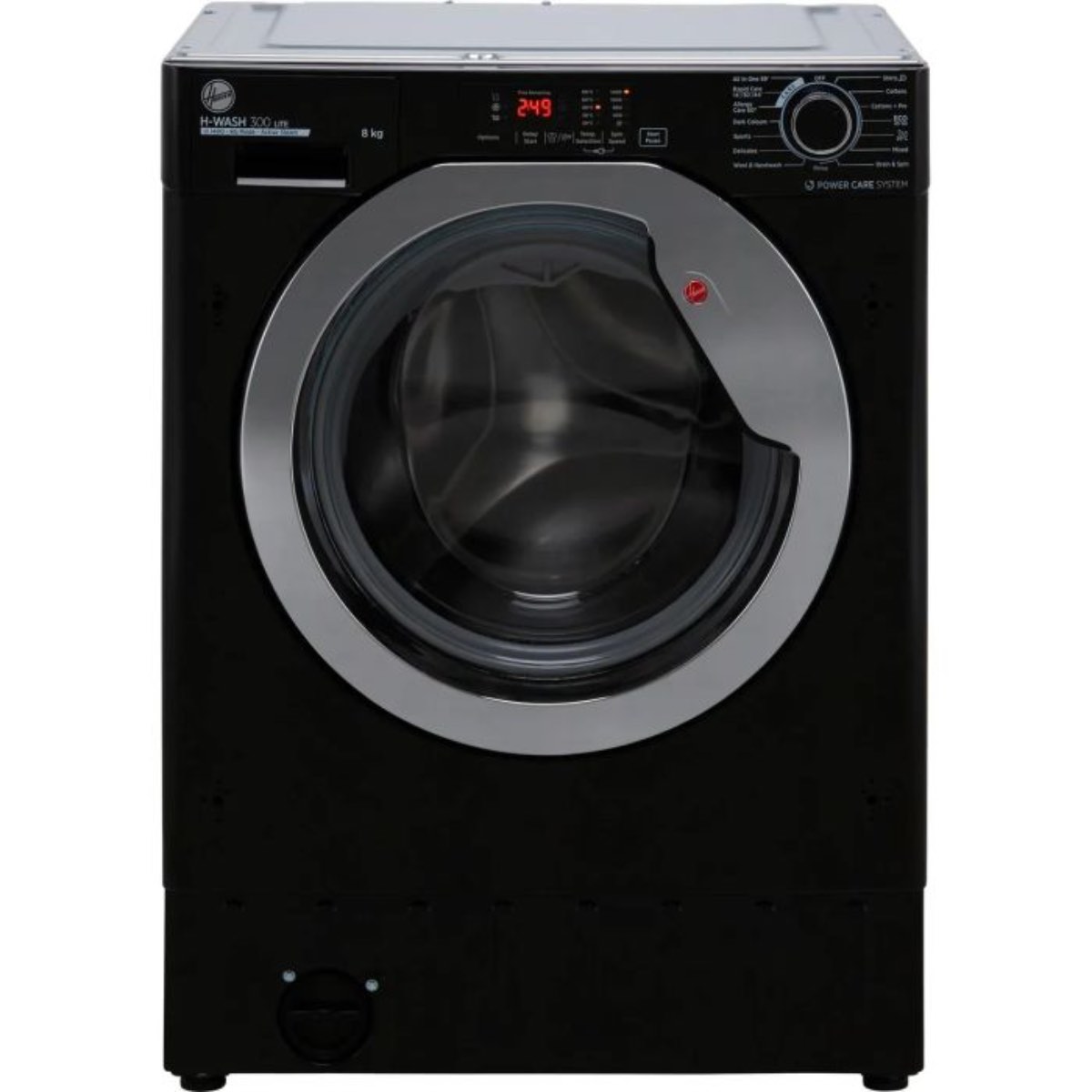
Hoover washing machines primarily focus on performance and affordability, with eco-friendliness playing a less prominent role. However, there are still factors to consider if you’re an eco-conscious consumer interested in Hoover washers:
Potential Eco-Friendly Aspects:
-
Water Level Selection: Some Hoover models allow you to choose water level settings based on load size. This flexibility helps prevent water waste by adjusting water usage according to laundry needs.
-
Durable Construction: Hoover appliances are known for their durability. A long-lasting washer reduces waste compared to frequently replacing less reliable models. This indirectly contributes to a smaller environmental footprint.
Important Considerations:
-
Limited Eco-Friendly Information: Finding specific details about energy efficiency ratings, water usage per cycle, or recycled materials used can be challenging for Hoover washers. Transparency on these aspects is minimal.
-
Focus on Value Over Eco-Innovation: Hoover washers generally prioritize affordability and user-friendly features over cutting-edge eco-technologies found in other brands. Consider whether a lower price point is more important to you than the most eco-friendly features.:
While Hoover washing machines might not be the top choice for strictly eco-conscious consumers, they can still be a viable option if affordability and basic water-saving features like water level selection are your priorities. However, if you seek appliances with a strong focus on energy efficiency, sustainable materials, and cutting-edge eco-technologies, other brands might be a better fit.
Check out the Hoover washing machine range by clicking here.
10. Electrolux Washing Machines
Electrolux prioritises both exceptional cleaning performance and environmental responsibility. Their washing machines integrate innovative technologies with a focus on resource conservation, making them a top choice for eco-conscious consumers. Here’s what sets them apart:
-
Energy Efficiency: Every Electrolux washing machine is designed to significantly reduce energy and water usage. Cleaning and caring for clothing without compromising performance on energy consumption earns them high marks for eco-friendliness. Many models achieve Energy Star certification, guaranteeing they meet strict energy efficiency standards.
-
OptiSense Technology: This intelligent system ensures the right level of care by matching time, energy, and water consumption to your specific load size. This technology prevents over-washing and unnecessary resource waste.
-
Durable Construction: Electrolux washers are built to last. A high-quality, durable washer reduces waste compared to frequently replacing less reliable models. This indirectly contributes to a smaller environmental footprint.
-
Sustainable Practices: Electrolux demonstrates a commitment to environmental responsibility throughout their operations. They utilize recycled materials in their manufacturing processes and strive to reduce their carbon footprint throughout their supply chain.
By prioritizing both powerful cleaning and resource conservation, Electrolux washing machines offer a compelling choice for eco-conscious consumers. They deliver exceptional washing performance while minimizing environmental impact.
Check out the Electrolux washing machine range by clicking here.
Understanding Environmental Impact: Choosing an Eco-Friendly Washing Machine
Selecting an eco-friendly washing machine goes beyond aesthetics and price tags. It’s about minimizing your environmental footprint while ensuring exceptional cleaning performance. Here’s a breakdown of key factors to consider when evaluating the environmental impact of washing machines:
Energy Consumption: Assessing Energy Efficiency Ratings
Modern washing machines drastically reduce energy consumption compared to older models. However, significant differences exist between brands and specific models. Here’s how to assess energy efficiency:
- Energy Star Certification: Look for the Energy Star label. This signifies the washer meets strict energy efficiency standards, meaning it uses significantly less energy than conventional models. The estimated annual energy use might also be displayed on the Energy Star label, allowing you to compare different models.
- Kilowatt-hours per cycle (kWh/cycle): This metric directly reflects energy consumption per wash cycle. Lower kWh/cycle ratings indicate greater energy efficiency. Compare this number across different models to identify the most energy-saving option.
Water Usage: Evaluating Water-Saving Features
Water conservation is crucial for environmental responsibility. Here’s how washing machines can minimize water use:
- Automatic Water Level Selection: Look for models that automatically adjust water levels based on load size. This prevents overfilling the washer with unnecessary water for small loads.
- Water Efficiency Rating: Similar to energy efficiency, some regions rate water efficiency of appliances. A higher water efficiency rating indicates the washer uses less water per cycle.
- Water-saving Wash Cycles: Many machines offer eco-wash cycles designed to minimize water usage while maintaining cleaning effectiveness. These cycles often utilize lower water levels or shorter wash times.
Materials and Manufacturing: Considering Sustainable Materials and Production Processes
Environmental impact extends beyond a machine’s operation. Here’s how some manufacturers prioritize sustainability:
- Recycled Materials: Look for brands that incorporate recycled materials into their washing machines. This reduces reliance on virgin plastic and minimizes waste.
- Sustainable Manufacturing: Research a brand’s commitment to sustainable manufacturing practices. This might involve reducing energy consumption during production or implementing recycling programs for manufacturing waste.
By evaluating energy consumption, water usage, and materials/manufacturing, you can make an informed decision when selecting an eco-friendly washing machine that aligns with your environmental values.
Features of Eco-Friendly Washing Machines
- Energy-efficient design: discussing technologies such as inverter motors and heat pump drying
- Water-saving features: exploring load sensors, automatic water level adjustment, and low water usage programs
- Eco-friendly materials: emphasizing recycled materials and chemical-free coatings
Understanding Certifications and Labels: Navigating the Eco-Friendly Washing Machine Landscape
Choosing an eco-friendly washing machine can feel overwhelming with various certifications and labels vying for your attention. Here’s a breakdown of the most important ones to help you navigate your eco-conscious purchase:
Energy Star Certification: The Gold Standard for Energy Efficiency
The Energy Star label is the most widely recognized symbol of energy efficiency for appliances in North America. Earning this certification signifies a washing machine exceeds strict energy performance standards.
Benefits of Energy Star Certification:
- Reduced Energy Consumption: Energy Star washers use significantly less energy than conventional models. This translates to lower energy bills and a smaller environmental footprint.
- Cost Savings: While the initial cost of an Energy Star washer might be slightly higher, the energy savings often accumulate significant cost benefits over the lifespan of the appliance.
- Reliable Benchmark: The standardized testing procedures behind Energy Star certification ensure consistent and reliable comparisons between different washing machine models.
Eco-Labels and Standards: Exploring Additional Sustainability Credentials
While Energy Star focuses on energy efficiency, other eco-labels consider a broader range of environmental factors. Here are a couple of reputable certifications to keep in mind:
WaterSense (North America): This EPA program identifies water-efficient appliances. The WaterSense label indicates the washer meets specific water usage criteria, helping you choose models that minimize water waste.
Ecolabel (European Union): This voluntary eco-label considers an appliance’s entire lifecycle, including energy and water consumption, use of hazardous materials, and durability. The Ecolabel rating system (A+++ to D) allows for easy comparison between models.
Remember: The availability and importance of these labels may vary depending on your region. Research local eco-labels relevant to your area for a more comprehensive picture.
By understanding Energy Star certification and exploring additional eco-labels, you can confidently select a washing machine that balances environmental responsibility with exceptional cleaning performance.
Longevity and Maintenance: Investing in a Sustainable Laundry Routine
Choosing an eco-friendly washing machine goes beyond its initial environmental footprint. Extending the lifespan of your appliance significantly reduces waste associated with manufacturing and disposal. Here’s how to maximize the longevity of your washing machine and contribute to a more sustainable laundry routine:
Durability: The Importance of a Long-Lasting Machine
While all washing machines eventually need replacing, opting for a durable model significantly reduces waste. Here’s why durability matters:
- Reduced Environmental Impact: Fewer replacements translate to less manufacturing waste and lower energy consumption associated with producing new machines.
- Cost Savings: A reliable and long-lasting washer saves you money in the long run by avoiding frequent replacements.
- Peace of Mind: A durable machine provides reliable performance and fewer repair worries over an extended period.
Look for brands known for building quality washers with sturdy components and robust motors. Research warranty information to gauge a manufacturer’s confidence in their product’s longevity.
Maintenance Considerations: Keeping Your Washer Running Smoothly
Simple maintenance practices can significantly extend the lifespan of your washing machine and minimize environmental impact by reducing the need for repairs and replacements. Here are some key tips:
- Regular Cleaning: Clean the detergent dispenser and door seal regularly to prevent mold and mildew growth. Wipe down the exterior to maintain a clean and sanitary environment.
- Proper Dosing: Avoid using excessive detergent. Over-sudsing can strain the machine and clog components. Refer to the manufacturer’s instructions for proper dosing based on water hardness and load size.
- Cleaning Cycles: Run cleaning cycles periodically, especially if you often wash with cold water. These cycles help remove detergent buildup and maintain internal components.
- Balanced Loads: Avoid overloading the washer. This can put stress on the motor and lead to premature wear and tear. Distribute laundry evenly for optimal washing and machine performance.
By prioritizing durability when purchasing and implementing regular maintenance practices, you can significantly extend the lifespan of your washing machine, contributing to a more sustainable laundry routine.
Cost Considerations and Savings: Balancing Eco-Friendly Choices with Budget
While eco-friendly washing machines might carry a slightly higher initial price tag, several factors can make them cost-effective in the long run. Here’s a breakdown of the financial implications:
Initial Investment vs. Long-Term Savings
- Energy Efficiency Pays Off: Energy Star certified washers use significantly less energy than conventional models. These energy savings translate to lower electricity bills over the years.
- Water Conservation Adds Up: Water-efficient washing machines minimize water usage per cycle. In regions with water meters, reduced water consumption can lead to lower utility bills.
- Durability Matters: A well-built, durable washing machine lasts longer, avoiding the costs associated with frequent replacements.
While the upfront cost might be higher, consider the long-term financial benefits of energy savings, water conservation, and reduced replacement needs.
Government Incentives and Rebates: Financial Rewards for Sustainability
Many governments and utility companies offer incentives to encourage consumers to choose energy-efficient and water-saving appliances. Here are some potential benefits to explore:
- Tax Credits and Rebates: Research federal or state tax credits available for purchasing Energy Star certified washing machines. Local utility companies might also offer rebates on eco-friendly appliances.
- Appliance Recycling Programs: Some government-backed programs provide financial rewards for recycling old appliances. This can help offset the initial cost of a new, eco-friendly washing machine.
By factoring in long-term savings and potential financial incentives, eco-friendly washing machines can be a smart investment for your wallet and the environment.
Conclusion: Making Informed Choices for a Greener Laundry Routine
Choosing an eco-friendly washing machine empowers you to minimize your environmental impact while maintaining clean clothes. Let’s recap the key takeaways to guide you towards a sustainable laundry solution:
Key Considerations for Selecting an Eco-Friendly Washing Machine:
- Energy Efficiency: Look for Energy Star certified models that significantly reduce energy consumption. Evaluate kilowatt-hours per cycle (kWh/cycle) to compare efficiency between models.
- Water Usage: Prioritize washers with automatic water level selection and water-saving cycles. Consider regions with water efficiency ratings when making your choice.
- Materials and Manufacturing: Research brands that incorporate recycled materials and sustainable manufacturing practices.
- Certifications and Labels: Energy Star is the gold standard for energy efficiency. Explore regional eco-labels like WaterSense (North America) or Ecolabel (European Union) for a broader sustainability picture.
- Longevity and Maintenance: Invest in a durable washing machine from a reputable brand. Implement regular maintenance practices to extend its lifespan.
- Cost Considerations and Savings: Factor in long-term energy and water savings as well as potential government incentives when evaluating the cost-effectiveness of eco-friendly models.
Making a Difference, One Wash at a Time
By selecting an eco-friendly washing machine based on these considerations, you’re making a conscious choice towards a greener home and a healthier planet. Remember, every eco-friendly wash cycle contributes to a more sustainable future. Let’s wash smarter, not harder, for the environment’s sake.
Take a look at more eco friendly products.


